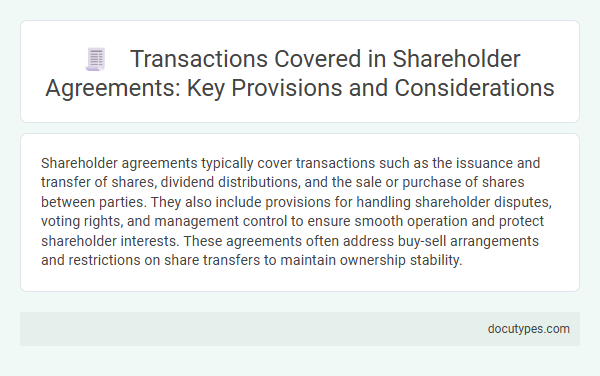Shareholder agreements typically cover transactions such as the issuance and transfer of shares, dividend distributions, and the sale or purchase of shares between parties. They also include provisions for handling shareholder disputes, voting rights, and management control to ensure smooth operation and protect shareholder interests. These agreements often address buy-sell arrangements and restrictions on share transfers to maintain ownership stability.
Introduction to Shareholder Agreements and Covered Transactions
Shareholder agreements are legal contracts that outline the rights, responsibilities, and obligations of shareholders within a company. These agreements cover various transactions, including the sale or transfer of shares, dividend distributions, and voting rights. Understanding these covered transactions helps you protect your investment and maintain control over important company decisions.
Defining Covered Transactions in Shareholder Agreements
What types of transactions are typically included in shareholder agreements? Shareholder agreements commonly define covered transactions to regulate key financial and operational dealings between shareholders. These transactions often include share transfers, rights of first refusal, and obligations during mergers or acquisitions.
Types of Transactions Commonly Addressed
| Type of Transaction | Description |
|---|---|
| Share Transfers | This involves the rules and restrictions governing the sale or transfer of shares between shareholders or third parties, ensuring control over who can hold shares in the company. |
| Dividend Distribution | Outlines the timing, amount, and approval process for distributing dividends to shareholders, protecting your interests in profit sharing. |
| Capital Contributions | Details the obligations of shareholders to provide additional capital, including procedures for calls on capital and consequences of non-payment. |
| Shareholder Loans | Specifies terms for loans made by shareholders to the company, including interest rates, repayment schedules, and security arrangements. |
| Exit Strategies | Defines processes such as buy-sell agreements, drag-along rights, and tag-along rights to manage how shareholders can exit the company. |
| Voting Rights | Regulates the allocation of voting power and how decisions are made during shareholder meetings or by consent, impacting control over company decisions. |
| Dispute Resolution | Establishes mechanisms for resolving conflicts between shareholders related to transactions or corporate governance, often through mediation or arbitration. |
Approval Thresholds and Voting Rights
Shareholder agreements typically include transactions such as the sale of shares, mergers, and significant asset transfers. These agreements specify approval thresholds required for such actions, ensuring major decisions have adequate shareholder consent.
Voting rights in shareholder agreements determine how votes are allocated among shareholders during decisions on transactions. Clear definitions of voting thresholds protect minority shareholders and maintain balance in corporate governance.
Pre-Emptive Rights and First Refusal Provisions
Shareholder agreements cover various transactions to protect the interests of the company's owners. Key provisions often include mechanisms that regulate share transfers and prevent unwanted third-party involvement.
- Pre-Emptive Rights - These rights allow existing shareholders the priority to purchase new shares before they are offered to outsiders, preserving ownership percentages.
- First Refusal Provisions - Shareholders must offer their shares to existing partners first before selling to external parties, ensuring control within the group.
- Transfer Restrictions - Limits are placed on the sale or transfer of shares, maintaining the company's ownership structure and stability for you and other shareholders.
Tag-Along and Drag-Along Rights
Shareholder agreements often cover specific transaction types to protect minority and majority shareholders. Tag-along and drag-along rights are critical components that manage how shares are sold between parties.
- Tag-along rights - Ensure minority shareholders can join a sale initiated by majority shareholders under the same terms.
- Drag-along rights - Allow majority shareholders to compel minority shareholders to sell their shares when a third party offers to buy the company.
- Transaction inclusion - These rights regulate transfer of shares and help maintain control balance during ownership changes.
Including tag-along and drag-along provisions in shareholder agreements safeguards equitable treatment during share sales.
Restrictions on Transfer of Shares
Shareholder agreements typically include various types of transactions, with a primary focus on restrictions on the transfer of shares. These restrictions safeguard the company's ownership structure and ensure control remains within the agreed group of shareholders.
The agreement may specify conditions such as right of first refusal, tag-along rights, and limitations on selling shares to outside parties. You must carefully review these provisions to understand your obligations and rights regarding share transfers.
Treatment of Mergers, Acquisitions, and Asset Sales
Shareholder agreements commonly cover transactions such as mergers, acquisitions, and asset sales to define the rights and obligations of shareholders during significant corporate changes. These agreements establish clear procedures and protections to manage the transfer of ownership and control.
In the context of mergers, shareholder agreements often specify approval thresholds required from shareholders before the merger can proceed. Acquisitions addressed in these agreements typically include terms for drag-along and tag-along rights, ensuring minority shareholders receive fair treatment. Asset sales clauses protect shareholder interests by outlining conditions under which key company assets can be sold or transferred.
Valuation Methods and Payment Structures
Shareholder agreements outline specific transaction types that affect ownership and control within a company, focusing on valuation methods and payment structures. These agreements ensure clear terms for share transfers, buy-sell arrangements, and capital contributions.
- Valuation Methods Defined - Includes agreed procedures such as market value, book value, or agreed formula valuation for determining share price in transactions.
- Payment Structures Specified - Details options like lump-sum payments, installment plans, or earn-outs to facilitate financial arrangements during share transfers.
- Transaction Types Covered - Encompasses share transfers between existing shareholders, rights of first refusal, and share buy-back provisions within the agreement.
What Types of Transactions Are Included in Shareholder Agreements? Infographic

